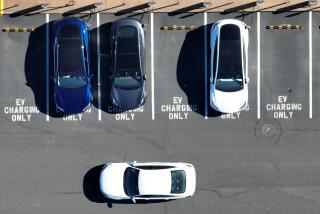Auto Makers to Test Fuel-Cell Vehicles in State
DETROIT — Ford Motor Co. and DaimlerChrysler are expected to announce Tuesday that they will put as many as 30 fuel-cell cars on California roads beginning next year. The program is aimed at demonstrating the feasibility of the technology considered most likely to supplant the internal combustion engine in coming decades.
The test program, which will involve an additional 15 fuel-cell buses, is a major first step toward the commercialization of emerging fuel-cell technology. The auto makers have vowed to begin mass production of fuel-cell vehicles in 2004 despite major obstacles.
The announcement comes as the Environmental Protection Agency is preparing to issue new pollution rules that are likely to require auto makers to greatly reduce tailpipe emissions. The nation’s auto makers are trying to convince regulators that they are committed to new technology to reduce emissions. They argue that new strict emissions mandates are unnecessary.
All the world’s auto makers are working on fuel-cell, hybrid-electric and battery-powered electric vehicles, many in joint ventures. General Motors Corp. is expected to announce today a collaboration involving advanced-technology vehicles, possibly with Toyota Motor Co., that will probably include fuel cells.
Ford and DaimlerChrysler have been partners for two years on fuel-cell research and development. They are teaming with Ballard Power Systems, a small Vancouver, Canada, technology company that is a leading maker of fuel cells.
Fuel cells, used to power early U.S. spacecraft, use hydrogen and oxygen to create electricity and water vapor. The electrochemical devices are cleaner and more efficient than traditional gas-powered engines.
The demonstration program is scheduled to be announced Tuesday morning in Sacramento at a press conference with Gov. Gray Davis. Ford and DaimlerChrysler officials declined to comment on their plans, but word was circulating late last week among the environmental community.
“This is a huge step,” said Jason Mark, transportation analyst for the Union of Concerned Scientists. “This takes fuel cells beyond research and development and toward commercialization.”
Sources familiar with the plans said that in addition to the auto companies and Ballard, the demonstration program would also involve the oil industry and state government.
Texaco, Shell and Arco are expected to make a commitment to provide liquid hydrogen for the 45 test vehicles. They also are likely to commit research dollars to the development of a hydrogen or methanol fueling infrastructure.
*
The California Air Resources Board and California Energy Commission will also be involved, though their exact involvement could not be learned.
Despite the high expectations for fuel cells, the auto makers acknowledge that major hurdles must be overcome before such vehicles can be brought to showrooms. They now cost 10 times too much, are at least 600 pounds too heavy and utilize either hydrogen or methanol, fuels not easily accessible. It is expected that DaimlerChrysler will use the latest version of its New Electric Vehicle, known as Necar 3, for the demonstration program. The company recently unveiled the vehicle in Washington.
Necar 3 is based on a Mercedes-Benz A-Class subcompact. The fuel cell is fed liquid hydrogen that is stored in the vehicle’s trunk. Each vehicle costs more than $1 million to produce, though officials say it will be competitively priced with gas-powered vehicles when eventually mass produced.
Ford’s demonstration vehicle is expected to also use liquid hydrogen, which must be stored under pressure at minus 400 degrees. It will be based on Ford’s experimental P2000 vehicle, which was shown earlier this year at the Detroit auto show.






